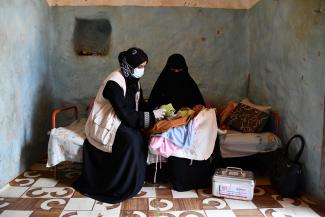USAID supports lifesaving reproductive, maternal, and child health services and a stronger health system to reach the most vulnerable populations in Yemen.
Yemen is suffering the largest humanitarian crisis in the world, exacerbated by ongoing conflict. USAID development assistance in Yemen bridges the relief-to-development continuum and strengthens Yemen’s resiliency through programs that stabilize the economy, rebuild basic education and health systems, increase social cohesion, and improve water sector access and management.
In Yemen, 19.7 million people lack access to basic health services. Only 51percent of the health facilities in Yemen are fully functioning and of those, most lack operational specialists, equipment, and basic medicines. These gaps impact services for the most vulnerable, especially women and children. Yemen’s maternal mortality ratio is one of the highest in the region at 164 maternal deaths per 100,000 live births. Among children, the under-5 mortality rate is 59.6 deaths per 1,000 live births, infant mortality rate is 45.7 deaths per 1,000 live births, and neonatal mortality rate is 28.1 deaths per 1,000 live births. In addition, the degrading health care system has resulted in vulnerability to and the emergence of diseases that can generally be cured or have been eradicated elsewhere. This ranges from a cholera outbreak to the reemergence of diphtheria, measles, and polio.
The COVID-19 pandemic exacerbated these issues with a lack of testing, treatment, and reporting capacity and low vaccine acceptance among the population.

Omar al-Gunaid for USAID
